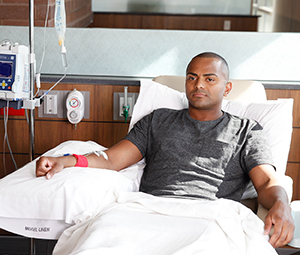Laryngeal Cancer: Chemotherapy
Laryngeal Cancer: Chemotherapy
What is chemotherapy?

When might chemotherapy be used for laryngeal cancer?
Chemotherapy might be used for laryngeal cancer:
Before, or instead of, surgery to try to preserve your voice. In many cases, the tumor will shrink enough from chemotherapy that the surgeon will have to remove only part of your voice box.
Along with radiation to try to preserve your voice.
After surgery or radiation to try to kill any remaining cancer cells that may not be visible.
To treat cancers that are too large or have spread too far to be treated with surgery alone.
How is chemotherapy given for laryngeal cancer?
Chemotherapy for laryngeal cancer is given by injection. These medicines may be used alone or in combination with other therapies.
Chemotherapy may be done as an outpatient visit to a hospital. This means you go home the same day. Or it may be done at your doctor’s office, a chemotherapy clinic, or at home. In some cases, you may stay in the hospital during treatment. This depends on the medicines, your treatment plan, and your overall health.
Most people take chemotherapy medicines in cycles. That means you may take the medicine for a set amount of time and then you have a rest period. Each period of treatment and rest is one cycle. You may have several cycles. Having treatment in cycles helps by:
Killing more cancer cells. The medicine can kill more cancer cells over time, because cells aren't all dividing at the same time. Cycles allow the medicine to fight more cancer cells.
Giving your body a rest. Treatment is hard on other cells of the body that divide quickly. This includes cells in the lining of your mouth and stomach. This causes side effects, such as sores and nausea. Between cycles, your body can get a rest from the chemotherapy.
Giving your mind a rest. Having chemotherapy can be stressful. Taking breaks between cycles can let you get an emotional break between treatments.
What are some of the medicines commonly used to treat laryngeal cancer?
These are some of the common chemotherapy medicines used to treat laryngeal cancer. In many cases more than one medicine is used. This is called combination therapy.
5-fluorouracil or 5-FU
Carboplatin
Cisplatin
Docetaxel
Paclitaxel
What are common side effects of chemotherapy?
Side effects are common with chemotherapy. But it’s important to know that they can often be prevented or controlled. The side effects of chemotherapy depend on the type of medicines you take and the doses used. Cancer-killing medicines affect any cells that grow quickly. That includes cancer cells as well as healthy cells in your bone marrow (where new blood cells are made) and digestive system.
During treatment, your doctor will take small samples of your blood for testing. If your number of white blood cells is low during chemotherapy, you are at greater risk for infection. You should tell your doctor or nurse right away about any fever you have during chemotherapy. A fever is a possible sign of infection. A fever is defined as a body temperature higher than 100.4°F (38°C).
If your platelets, or blood cells that help with clotting, are low during chemotherapy, you may bruise or bleed more easily. Tell your doctor or nurse right away if you experience this.
Your red blood cells carry oxygen from your lungs to other parts of your body. Their numbers may also drop during chemotherapy. This is called anemia. Occasionally, a blood transfusion may be needed. These are possible symptoms of anemia:
Extreme tiredness or fatigue
Dizziness
Shortness of breath
Lack of energy
Heart palpitations
These are other possible side effects from chemotherapy:
Appetite loss
Constipation
Diarrhea
Hair loss
Mouth sores
Nausea
Vomiting
Some other side effects, such as nerve damage, can be caused by specific medicines.
You should tell your doctor or nurse about any side effects you have. Make sure to ask which problems, if any, require calling your healthcare provider or nurse right away. Many medicines can help you deal with these side effects and perhaps prevent them from occurring. Most of these side effects go away over time once treatment ends.
It may be helpful to keep a diary of your side effects. Write down physical, thinking, and emotional changes. A written list will make it easier for you to remember your questions when you go to your appointments. It will also make it easier for you to work with your healthcare team to make a plan to manage your side effects.
Working with your healthcare provider
It's important to know which medicines you're taking. Write your medicines down, and ask your healthcare team how they work and what side effects they might have.
Talk with your healthcare providers about what signs to look for and when to call them. For example, chemotherapy can make you more likely to get infections. Make sure you know what number to call with questions. Is there a different number for evenings and weekends?
It may be helpful to keep a diary of your side effects. Write down physical, thinking, and emotional changes. A written list will make it easier for you to remember your questions when you go to your appointments. It will also make it easier for you to work with your healthcare team to make a plan to manage your side effects.
Updated:
May 31, 2018
Reviewed By:
Gersten, Todd, MD,Image reviewed by StayWell art team.,LoCicero, Richard, MD,Stump-Sutliff, Kim, RN, MSN, AOCNS